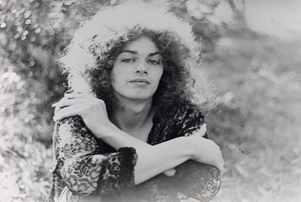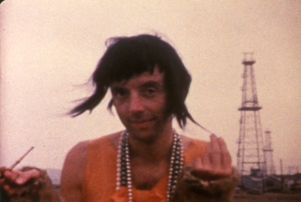Same Sex/Different Sex: Queer Identity and Culture
-
 Passion in a Seaside Slum (1962) by Robert Wade Chatterton
Passion in a Seaside Slum (1962) by Robert Wade Chatterton
-
 Passion in a Seaside Slum (1962) by Robert Wade Chatterton
Passion in a Seaside Slum (1962) by Robert Wade Chatterton
-
 I Don't Know (1970) by Penelope Spheeris
I Don't Know (1970) by Penelope Spheeris
-
 Passion in a Seaside Slum (1962) by Robert Wade Chatterton
Passion in a Seaside Slum (1962) by Robert Wade Chatterton
April 29, 2012, 7:30PM
Spielberg Theatre at the Egyptian, 6712 Hollywood Blvd., Los Angeles CA 90028
Alternative Projections: Experimental Film in Los Angeles, Screening 24
Co-presented by Outfest
In person: Penelope Spheeris, Linda Spheeris (schedules permitting)
At the Spielberg Theatre at the Egyptian, 6712 Hollywood Blvd.
SECOND SCREENING ADDED at 5:00 pm on SUNDAY!!!!
From the 1950s through the 1980s, underground film was an avenue for artistic self-expression for lesbian and gay artists, and also occasionally provided a way for LGBT people to see representations of themselves without persecution. But the cultural climate changed dramatically over the decades, with the closeted screenings for friends of the earlier period changing to public screenings and well-advertised events. For example, in 1957 and 1964, the exhibitors at the Coronet Theater and the Cinema Theater respectively were each arrested by the Los Angeles Police for exhibiting obscene works, and both times the police were primarily targeting films with homoerotic (but not explicit) content – Fireworks by Kenneth Anger and Voices by John Schmitz in 1957; Scorpio Rising by Anger in 1964. Both times the exhibitor was originally convicted, but the conviction overturned in Los Angeles Country Superior Court. [We’ll be exhibiting the films from 1957 in an upcoming show on Raymond Rohauer and the Coronet Theater.]
By the late 1960s, after various court cases, such police action was no longer prevalent. The 1970s and 1980s brought the rise of identity politics, creating new venues for self-expression. There soon resulted healthy numbers of works with Queer Identity and culture as the subject by makers such as Pat Rocco, and multiple artists from the Woman’s Building – documentaries; fantasies; activist works; news reporting; experimental films – a full range of media art showing the lives and conflicts and creativity of LGBT artists – a point of view not yet found in mainstream media.
This program starts with a little-known work from 1962, made by Robert Chatterton, who was also a prominent underground film exhibitor. Taylor Mead, on one of his occasional visits to Los Angeles, acted in two films by Chatterton, including Passion in a Seaside Slum. Brought to our attention by Marc Siegel in the Alternative Projections symposium in 2010, Filmforum arranged for the preservation of Passion in a Seaside Slum with the generous support of the National Film Preservation Foundation and the Film Foundation. This is the premiere screening of this new print. We are also screening a remarkable short documentary made by Penelope Spheeris and lesbian public service announcements from the Woman’s Building in the 1970s.
More films to be added!
Special thanks to Kristin Pepe, Outfest; the Getty Research Institute; Anthology Film Archives
The show is free! Reservations recommended, and will be held until 7:15 pm on show night, at which time they will be released to anyone present. Reservations available at
http://www.brownpapertickets.com/event/239845
See articles in the LA Weekly and the LA Times!
http://www.latimes.com/entertainment/news/movies/la-et-guidefeature-20120426,0,4532498.story
http://www.laweekly.com/2012-04-26/film-tv/Same-Sex-Different-Sex-alternative-projections-review/
Films to be Screened
-
 Passion in a Seaside Slum (1962) by Robert Wade Chatterton
Passion in a Seaside Slum (1962) by Robert Wade Chatterton
Passion in a Seaside Slum (1962, 16mm (orig. 8mm), color, silent, 32min.)
Directed by Robert Wade ChattertonRestored print from Los Angeles Filmforum. This film was preserved through the National Film Preservation Foundation's Avant-Garde Masters Grant program funded by The Film Foundation. Additional support from the Academy Film Archive.
In this silent color 8mm film shot in Venice Beach in 1961, Taylor Mead plays “the faggot” who persistently cruises a butch guy intent only on fishing in one of the canals. Mead uses the magic wand of a radio antenna to transform himself into ever more implausible drag figures in his attempts to garner the guy’s interest, but only succeeds in soliciting his amused laughs. “I played eight or more roles in this film–all bizarre, outrageous, non-pornographic but upsetting to many mores.” (Taylor Mead)
Robert Wade Chatterton was an actor, filmmaker, and experimental film exhibitor in Los Angeles from the 1940s to the 1980s. He founded Bob Chatterton’s Film Society in Los Angeles in the mid to late 1940s in the aftermath of earlier projects by Kenneth Anger, Curtis Harrington and Paul Ballard, among others.
Chatterton, who was a second cousin of early film star Ruth Chatterton, was himself an extra in Hollywood in the 1940s. In 1947, he also conceived an elaborate plan for Stage Door 16mm Productions or “The Little Theater of the Screen.” He intended to work with a regular company of producers, writers, and performers on the production of numerous amateur features and short subjects, which he would then present in various theaters throughout the country. He was also a well-known West Coast film collector, distributor and lecturer for three decades and possessed one of the largest collections of Laurel and Hardy short films. An authority on the comedy duo, he also became a close friend and confidante of Stan Laurel. In the 1960s, Chatterton made several films that were presented in avant-garde and amateur film contexts, but have been largely forgotten, including two 8mm color films made in 1961 featuring Taylor Mead, Passion in a Seaside Slum and The Hobo and The Circus. (For more, see David James's book, The Most Typical Avant-Garde)
-
 I Don't Know (1970) by Penelope Spheeris
I Don't Know (1970) by Penelope Spheeris
I Don't Know (1970, 16mm, b/w, sound, 18min.)
Directed by Penelope SpheerisA movingly intimate, funny, and unconventional portrait of Linda, a lesbian, and Jimmy, a transsexual, and their loving but uncertain relationship.
Interview with Penelope Spheeris: http://tinyurl.com/7wtgr38 -
Lesbian occupations--public service announcements (1970s, video, color, sound, 3 min., Each PSA 30” – 60” seconds)
Directed by Los Angeles Women’s Video CenterProduced by the Los Angeles Women’s Video Center.
Courtesy of the Getty Research Institute
The LA Women’s Video Center was a collective of video artists including Jerri Allyn, Nancy Angelo, Annette Hunt and Candace Compton. -
Fever Dream (1979, 7 min, 16mm, b&w, sound)
Directed by Chick StrandA wet hot dream about sensuality.
On Strand’s films: http://www.bfi.org.uk/sightandsound/reviews/specials/chick-strand.php
-
Kustom Kar Kommandos (1965, 16mm, color, sound, 3.5 minutes)
Directed by Kenneth AngerConcept, Direction and Editing: Kenneth Anger; Camera Assistant: Arnold Baskin; Music: The Parris Sisters; Cast: Sandy Trent (Car Customizer). Filmed in San Bernardino.
Pygmalion and his machine mistress.
To the soundtrack of "Dream Lover" a young man strokes his customized car with a powder puff.
"KUSTOM KAR KOMMANDOS was originally to be an eight-part, 30-minute film which Anger describes as 'an oneiric vision of a contemporary American (and specifically Californian) teenage phenomenon, the world of hot-rod and customized cars.' Anger made the episode presently shown as KUSTOM KAR KOMMANDOS to raise funds to finish the film, but was unable to do so and the project was abandoned." - Marilyn Singer, The American Federation of Arts -
The Game (1969, video (orig 16mm), 7 min)
Directed by Pat RoccoA fantasia of handsome men playing strip poker in a field...
Rocco began his professional career as a singer with his own radio program in the late 1940s; he went on to record an album of devotional music for Cornerstone Records and ministered for Youth for Christ. His talent brought him to the professional stage in a number of musicals. During 1955 and 1956, he toured the country with Marge and Gower Champion and later sang as a member of the Top Twenty singers on The Tennessee Ernie Ford Show. Rocco returned to the stage at the Cabaret Concert Theater, Los Angeles where he gained back stage experience. He started filming a large number of gay-themed films – short dramas, nudies, documentaries, and more, many of which screened theatrically in Los Angeles at the Park Theater by Macarthur Park, particularly from 1968-1972. He currently lives in Hawaii.